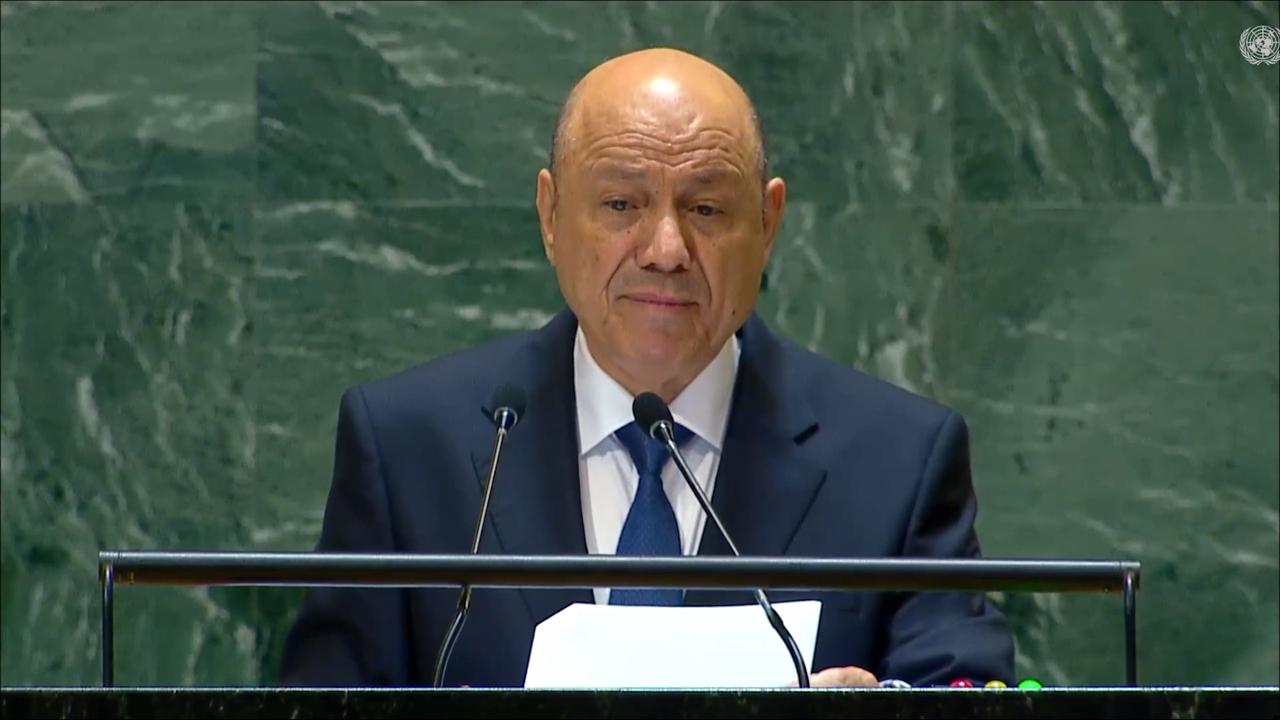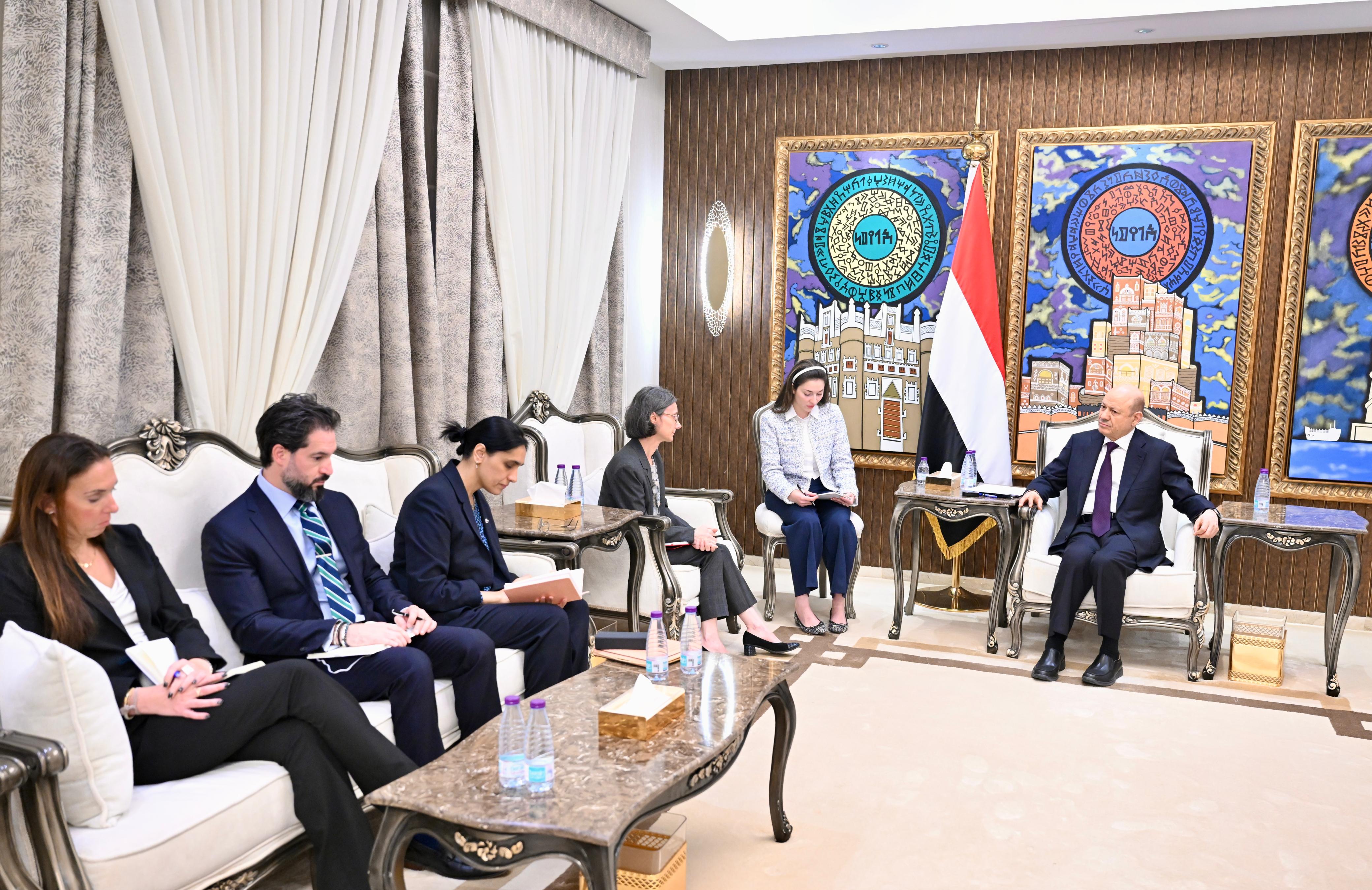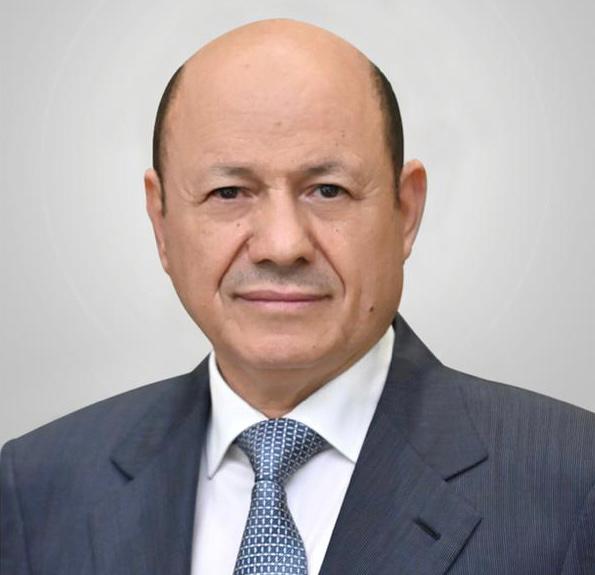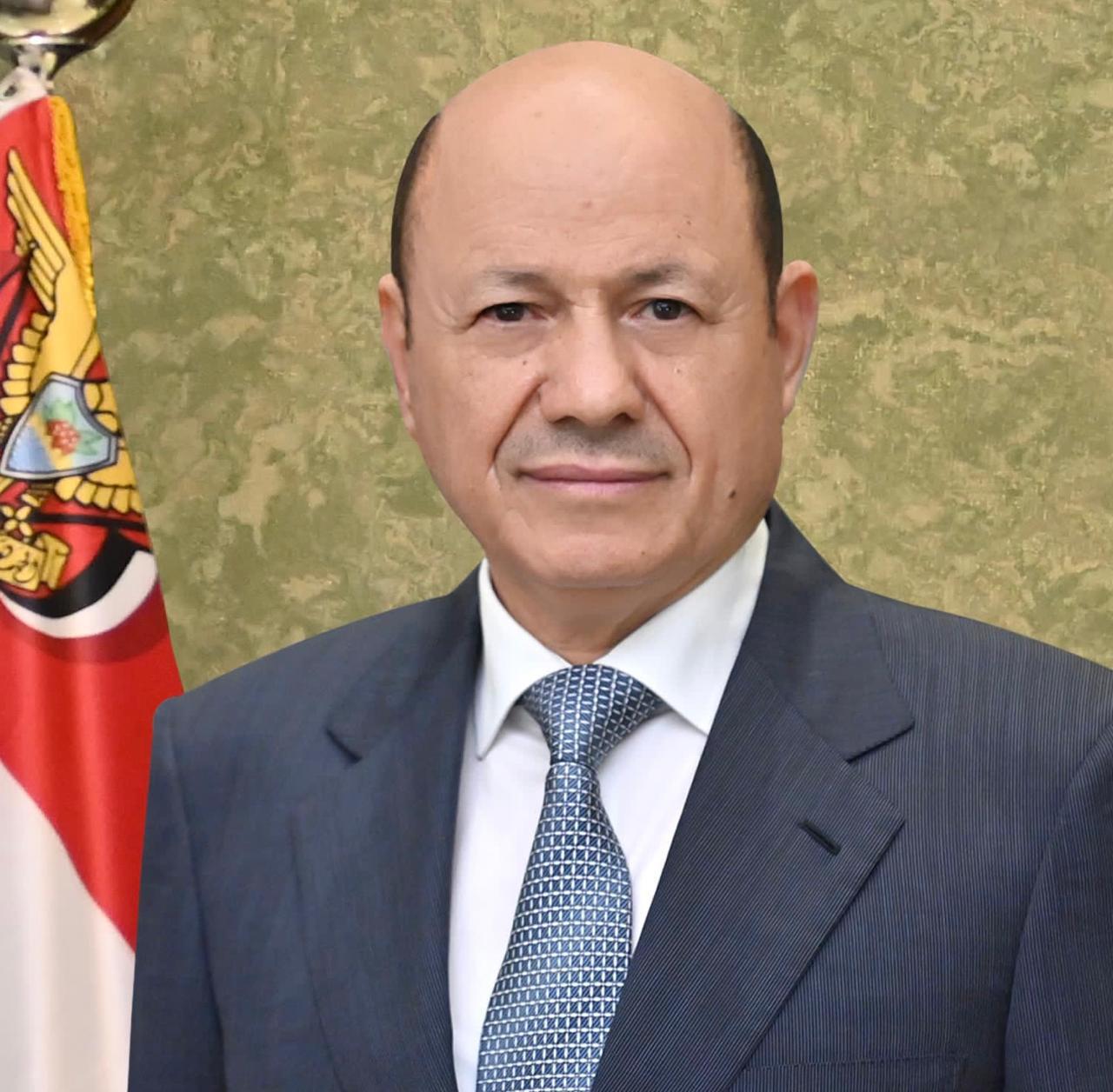
President Al-Alimi: The path to regional peace begins with supporting the national state and moderate forces in the region
New York
His Excellency President Dr. Rashad Mohammed Al-Alimi, President of the Presidential Leadership Council, said that the path to regional peace begins with supporting the national states that are members of the United Nations, and the moderate forces in the region led by the Kingdom of Saudi Arabia. It also begins with adopting an integrated deterrence strategy against militias and terrorist organizations.
In a speech before the 79th session of the United Nations General Assembly, the President of the Presidential Leadership Council called for a collective international approach to support the Yemeni government and enhance its institutional capabilities in protecting its territorial waters and securing its entire national territory.
The President renewed the government's commitment to a comprehensive and just peace approach in accordance with its national, regional and international references. But he stressed the need to strengthen the government's position to confront any other options, given the continued escalation of the Houthi militias at the local and regional levels.
His Excellency warned that the continued leniency of the international position towards these militias as it is today, portends a greater threat to international security and peace.
He added, "To prevent the expansion and sustainability of this escalation, there is an urgent need for a collective approach to support the Yemeni government and enhance its institutional capabilities to protect its territorial waters and secure its entire national territory."
The President stressed that without addressing these needs and implementing the relevant international legitimacy resolutions to ban the flow of Iranian weapons and dry up sources of funding, the militias will not engage with any efforts to achieve comprehensive and just peace. They will not stop their methods of blackmailing the regional and international communities.
The President of the Presidential Leadership Council expressed his gratitude, along with his fellow Council members and the government, for the unity of the international community and its supportive stance toward Yemen and its people. However, he called for this position to be transformed into actions and measures that align with the magnitude of the threats facing our country, our region, and international peace and security.
His Excellency stated that history teaches us that leniency with the enemies of peace is the beginning of the most heinous, costly and complex wars.
He explained that "despite the truce agreed upon by the government in April 2022, the militias continued their military violations and gross violations of human rights and national and international laws."
In this context, he pointed out that the Houthi militias bombed the oil export ports in Hadhramaut and Shabwa governorates in October 2022, which deprived the Yemeni people of the revenues needed to pay salaries and basic services, exacerbated human suffering, and caused the national currency to deteriorate to unprecedented levels.
The President also pointed out that the Yemeni government has frozen its recent decisions regarding the transfer of bank headquarters from Sana'a, which is under the control of the militias, to the interim capital, Aden, in response to the request of the United Nations and the international community to de-escalate. Provided that the Houthis participate in serious talks to address the economic crises, especially the currency crisis, in an effort to revive peace efforts under a roadmap mediated by our brothers in the Kingdom of Saudi Arabia and the Sultanate of Oman.
He added: “However, the militias responded by seizing three aircrafts of Yemenia Airlines, attacking the "Safer" oil facility in Marib Governorate with drones, and issuing racist laws and regulations to concentrate public office in a specific category of its loyal militants, most notably the judiciary. This indicates more expected repressive measures against public freedoms and civil work."
The President of the Presidential Leadership Council stressed that the continuation of this pattern of reckless escalation in response to the calm and initiatives presented by the government for more than two decades requires the international community to adopt firm policies to push the militias towards peace efforts in accordance with their international references, especially Resolution 2216, instead of their absurd escalation.
In his speech, the President of the Presidential Leadership Council touched upon the Houthis' gross violations of human rights, including the recent arrests of dozens of United Nations staff, to be added to the thousands of innocent women, children, youth, and the elderly who have been missing in its prisons for years. Most notably the struggler Mohammed Qahtan, who is included in the UN Security Council resolution.
He also addressed the repercussions of the Houthi militias' continued escalation of their terrorist attacks on global trade in the Red Sea and the surrounding waterways.
He stressed that the Houthi militias today pose an increasing threat not only to the Yemeni interior, as some believed a decade ago, but also to the stability of the entire region, and the safe flow of international trade exceeding a trillion dollars. Today they are strengthening their position as the first rebel group in history to use ballistic missiles and drones against civilian commercial ships.
The President of the Presidential Leadership Council presented the chronic economic challenges that were exacerbated by the terrorist Houthi attacks on oil facilities. He noted that the economic war waged by the militias is part of a broader hostile strategy aimed at weakening the government's ability to provide basic services and pay public sector salaries, which further exacerbates the humanitarian crisis for more than 14 million Yemenis.
He considered Yemen's recovery not just a national issue, but a regional and global need, as its stability is crucial to maintaining peace, regional security, and trade routes in the Red and Arab seas, and surrounding waterways including the Suez Canal.
He considered that the path to peace must pass through supporting the efforts of the moderate forces in the region, led by the Kingdom of Saudi Arabia, which, along with our brothers in the Coalition to Support Legitimacy, hold the responsibility of defending international resolutions, extended a helping hand, and opened its doors to receive millions from countries of wars and armed conflicts.
On the national level, the President of the Presidential Leadership Council reiterated that the brutal Israeli war on the Palestinian people must stop immediately, because that is the key to the desired peace and an entry point to lift the cover from Iran's pretexts and its agents to exacerbate the situation in the region.
He stressed that the way to end the suffering of the Palestinian people must be based on implementing international legitimacy resolutions and relevant references, especially the Arab Peace Initiative.
He said, "As is the case with the Yemeni and Palestinian cases, the only way to deter the brutal Israeli aggression on Lebanon will be through a firm position from the international community, the unity of the Lebanese themselves, the independence of their decision, and non-interference in their country's internal affairs.
Following is the full speech:
Your Majesties, Excellencies, and Highnesses,
His Excellency the President of the United Nations General Assembly, Philemon Yang,
His Excellency the Secretary-General of the United Nations, Antonio Guterres,
Ladies and Gentlemen,
It is indeed a fortunate coincidence that our address to you today takes place on a glorious national occasion for the Yemeni people—the 26th of September, the day when our people made history 62 years ago by toppling the racist Imamate regime and proclaiming the Republic.
This is an opportunity for me to once again extend my heartfelt congratulations to the Yemeni people everywhere, and to express our pride and appreciation for the courage of those young men and women, as well as intellectual leaders, who, on this immortal day each year, stand up to the brutal Houthi machinery of oppression, backed by the Iranian regime.
Mr. President,
Ladies and Gentlemen,
The Yemeni government remains committed to the approach of comprehensive and just peace in accordance with its national, regional and international references. But it is necessary in the meantime to strengthen its position to confront any other options, given the continued escalation of the Houthi militias at the local and regional levels.
To prevent the expansion and sustainability of this escalation, there is an urgent need for a collective approach to support the Yemeni government and enhance its institutional capabilities to protect its territorial waters and secure its entire national territory.
Without addressing these needs and implementing the relevant international legitimacy resolutions to ban the flow of Iranian weapons and dry up sources of funding, the militias will not engage with any efforts to achieve comprehensive and just peace. They will not stop their methods of blackmailing the regional and international communities.
Gentlemen,
History teaches us, that leniency with the enemies of peace is the beginning of the most heinous, costly and complex wars.
Despite the truce agreed upon by the government in April 2022, the militias continued their military violations and gross violations of human rights and national and international laws.
In October 2022, the Houthi militias bombed oil export ports in Hadhramaut and Shabwa governorates, depriving the Yemeni people of the revenues needed to pay salaries and basic services, exacerbating humanitarian suffering, and causing the national currency to deteriorate to unprecedented levels.
Recently, the Yemeni government froze its decisions regarding the transfer of bank headquarters from Sana’a, which is under the control of the militias, to the interim capital, Aden, in response to the request of the United Nations and the international community to de-escalate. Provided that the Houthis participate in serious talks to address the economic crises and revive peace efforts under a roadmap mediated by our brothers in the Kingdom of Saudi Arabia and the Sultanate of Oman.
However, the militias responded by seizing three aircrafts of Yemenia Airlines, attacking the Safer oil facility in Marib Governorate with drones, and issuing racist laws and regulations to focus public office on a specific category of its loyal militants, most notably the judiciary, indicating more expected repressive measures against public freedoms and civil work.
The continuation of this pattern of reckless escalation in response to calm initiatives requires the international community to adopt firm policies to push the militias towards the option of peace in accordance with its international references, especially Resolution 2216, instead of their absurd escalation.
Mr. President, Ladies and Gentlemen,
Almost four months have passed since the terrorist Houthi militias arrested dozens of United Nations staff, adding them to the thousands of innocent women, children, youth, and elderly people who have been missing in its prisons for years, most notably the struggler Mohammed Qahtan, who is covered by the UN Security Council resolution.
It is no secret that there is a widely held belief regarding the United Nations’ responsibility in enabling the militias to carry out the unprecedented abductions of this large number of aid workers, NGO staff, activists, and civil society leaders. This is attributed to the UN’s failure to respond to the Yemeni government’s request to relocate its offices from Sana’a to the interim capital, Aden.
By not taking the militia’s threat seriously and maintaining its headquarters in Sana’a, the UN has inadvertently enabled these terrorists to use its staff and assets as hostages, as bargaining chips to blackmail the international community, and to extract negotiating concessions that are unacceptable under any circumstances. The continuation of this situation cannot be defended or justified, because the presence of the UN headquarters in Sana’a constitutes an incentive for militias designated on the terrorist list, and a danger to relief workers and human rights defenders. Therefore, it is necessary to review these policies and arrangements immediately.
Mr. President,
Ladies and Gentlemen,
With their ongoing terrorist attacks on global trade in the Red Sea and surrounding waterways, the Houthi militias are showing that they pose a growing threat not only to Yemen’s interior, as some believed a decade ago, but also to the stability of the entire region and the safe flow of more than a trillion dollars in international trade.
Today, they are cementing their position as the first rebel group in history to use ballistic missiles and drones against civilian commercial vessels.
Late last month, the Houthi militias struck the tanker “Sounion,” carrying about a million barrels of crude oil, sparking fires that threatened to lead to one of the largest oil spills in history, before the ship was narrowly rescued by the international coalition.
This is not the first incident that the militias have committed, as they have previously boasted of sinking two other ships, and for years they have obstructed efforts to unload the dilapidated Safer ship, which was carrying a similar quantity of crude oil, which confirms that their terrorist acts will remain a permanent threat to maritime security.
Ladies and Gentlemen,
The Yemeni economy has been facing complex challenges for years, but the Houthi terrorist attacks on oil facilities have deepened the financial crisis in an unprecedented manner, depriving the Yemeni people and their government of the main revenues directed to paying salaries and providing services.
The economic war waged by the militias is part of a broader hostile strategy aimed at weakening the government’s ability to provide basic services and pay public sector salaries, which further exacerbates the humanitarian crisis for more than 14 million Yemenis.
It is therefore important for the international community to seriously sense the disastrous effects of these terrorist acts and take the initiative to secure vital infrastructure and protect shipping vessels in Yemeni ports in support of the right of Yemenis and their government to benefit from their national resources in order to improve their living conditions.
Protecting the lifelines of Yemen’s economy is essential not only for the country’s recovery and future development but also for the stability of the region and the long-term security of global energy.
Therefore, the Republic of Yemen renews its call to the international community to provide urgent and comprehensive support to address the catastrophic humanitarian situation and lay the foundations for long-term economic recovery. This includes not only immediate humanitarian assistance to alleviate suffering and stronger accountability mechanisms, especially in areas controlled by militias, but also greater investments in infrastructure, healthcare, education, sustainable development, and strengthening national capacities to mitigate the effects of climate change that have left hundreds of victims and displaced thousands of others in the past two months.
Yemen’s recovery is not just a national issue, but a regional and global need, as its stability is crucial to maintaining peace, regional security, and trade routes in the Red Sea, the Arabian Sea, and surrounding waterways including the Suez Canal.
We have appreciated international support in the past, and we will continue to express our gratitude for your moral responsibility, especially the Coalition to Support Legitimacy led by the Kingdom of Saudi Arabia and the United Arab Emirates, to achieve the aspirations of the Yemeni people for stability, peace, and prosperity, and to provide the necessary resources to rebuild their institutions and social fabric.
Mr. President,
Ladies and Gentlemen,
Today, the Arab region faces a difficult test in the battle to build the state and catch up with the progress of civilization that this session has as its theme.
Whenever the countries of the region witness real transformations towards development, peace, and prosperity, and the empowerment of their peoples to their political, economic, and social rights, the forces of evil emerge with their destructive projects, encouraged by international leniency towards rogue groups and their supporters who understand that they are on the right path to achieving their illegitimate goals.
The results of this battle between the forces of peace and the axis of evil will determine the chances of survival and development of civilization in this spot of land where the oldest human civilizations emerged, or its slide into more chaos, civil wars, the dominance of militias, weapons, oppression, and backwardness.
The path to peace must pass through supporting the efforts of the forces of moderation in the region, led by the Kingdom of Saudi Arabia, which, with our brothers in the Coalition to Support Legitimacy, has shouldered the responsibility of defending international resolutions, extended a helping hand, and opened its doors to receive millions from countries of war and armed conflict.
Therefore, history and logic explain why we are grateful to these countries, and why the world must rely on them to establish the foundations of peace and stability, and maximize the benefits of our peoples from their amazing economic and social development.
Gentlemen,
Accordingly, the false narratives regarding the Yemeni issue must end, especially those that minimize the role of Iran and its weapons that destabilize the security and stability of Yemen, the region, and the world.
Ladies and gentlemen, the brutal Israeli war on the Palestinian people must stop immediately, because that is the key to the desired peace and an entry point to lift the cover from Iran and its agents’ pretexts to exacerbate the situation in the region.
The Iranian exploitation of the just Palestinian cause is not a recent development but rather a long history of manipulation and propaganda that has only served to obstruct the peace process and undermine the achievements of the Palestinian people and their right to establish a fully sovereign, independent state.
As is the case with the Yemeni situation, the way to end the suffering of the Palestinian people must be based on implementing the resolutions of international legitimacy and relevant references, especially the Arab Peace Initiative.
As is the case with the Yemeni and Palestinian situations, the only way to deter the brutal Israeli aggression on Lebanon will be through a firm position from the international community, the cohesiveness of the Lebanese themselves, the independence of their decision and non-interference in their internal affairs, and the restoration of the Lebanese state’s decisions on peace and war.
Mr. President,
Ladies and Gentlemen,
I reiterate that the Universal Declaration of Human Rights begins by affirming that "recognition of the inherent dignity and of the equal and inalienable rights of all members of the human family is the foundation of freedom, justice and peace in the world”
These principles have relatively endured for decades under the umbrella of our international system, but the peak of rebellion against them, and against national and international ethics and norms, and boasting of committing all prohibitions, has only been reached by the leaders of Al-Qaeda, ISIS, and the Houthi militias that promise the world more destruction.
Thank you.
Peace, mercy, and blessings of Allah be upon you

President of Leadership Council Receives Ambassadors of France and United Kingdom and U.S. Chargé d’Affaires
His Excellency Dr. Rashad Mohammed Al-Alimi, President of the Presidential Leadership Council, received today, Sunday, Ms. Catherine Corm Kammoun, Ambassador of the French Republic, and Ms. Abda Sharif, Ambassador of the United Kingdom

President of the Leadership Council Leaves Aden for Consultations on National Developments
Fri ، 05 Dec 2025 04:38

